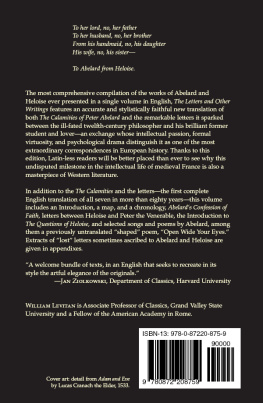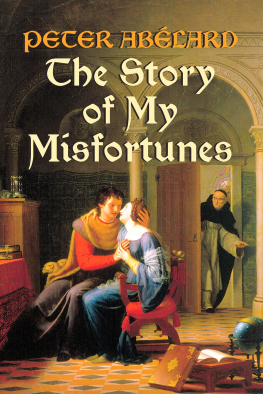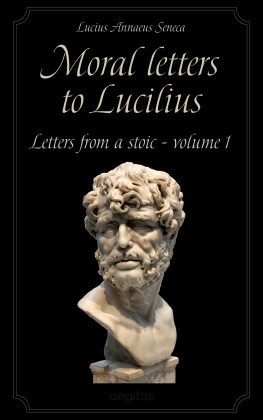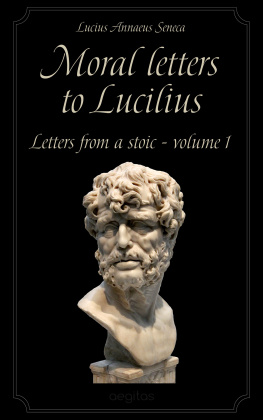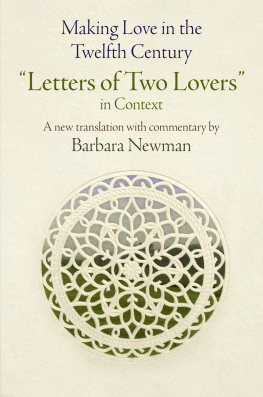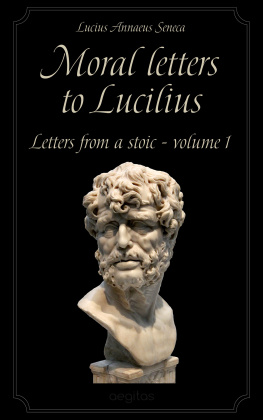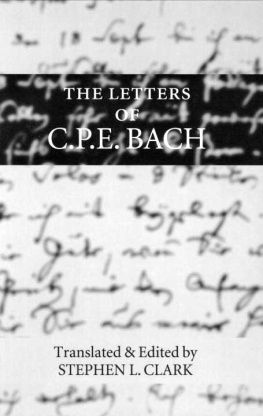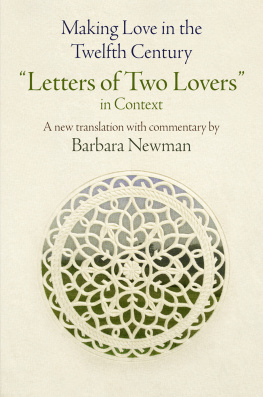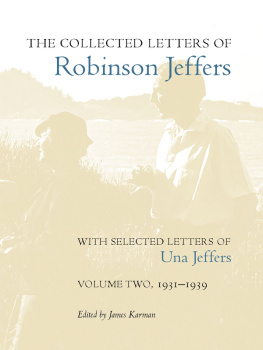ABELARD AND HELOISE
THE LETTERS
AND OTHER WRITINGS
ABELARD AND HELOISE
THE LETTERS
AND OTHER WRITINGS
Translated
with Introduction and Notes, by
WILLIAM LEVITAN
SELECTED SONGS AND POEMS
Translated by Stanley Lombardo
and by Barbara Thorburn
Hackett Publishing Company, Inc.
Indianapolis/Cambridge
Copyright 2007 by Hackett Publishing Company, Inc.
All rights reserved
Printed in the United States of America
12 11 10 2 3 4 5 6
For further information, please address:
Hackett Publishing Company, Inc.
P.O. Box 44937
Indianapolis, IN 46244-0937
www.hackettpublishing.com
Cover design by William Levitan and Abigail Coyle
Composition by William Hartman
Printed at Printed at Victor Graphics, Inc.
Library of Congress Cataloging-in-Publication Data
Abelard, Peter, 10791142.
[Selections. English. 2007]
The letters and other writings / Abelard and Heloise; translated,
with introduction and notes, by William Levitan ; selected songs and
poems translated by Stanley Lombardo and by Barbara Thorburn.
p. cm.
Includes bibliographical references and index.
ISBN 978-0-87220-876-6 ISBN 978-0-87220-875-9 (pbk.)
1. Abelard, Peter, 10791142Correspondence. 2. Helose, 11011164Correspondence. 3. Abbesses, ChristianFranceCorrespondence. 4. TheologiansFranceCorrespondence. 5. Love-letters. 6. Hymns. 7. Poetry. I. Hlose, 11011164. II. Levitan, William. III. Title.
B765.A21L48 2007
189'.4--dc22
[B]
2006034700
ePub ISBN: 978-1-60384-967-8
FOR
DEBRA
Mellificas enim tu, sed non soli tibi.
Like every student of Abelard and Heloise, I am indebted to a large number of critics and scholars, many of whose names appear in the select bibliography at the end of this volume. There is a smaller group, however, whose work I have found especially useful and continually stimulating throughout the course of this project: Michael Clanchy, Peter Dronke, David Luscombe, John Marenbon, the late Mary Martin McLaughlin, T. P. McLaughlin, and J. T. Muckle. In the absence of standard commentaries, I have freely consulted earlier translations for a community of opinion on many specific points; even when our interpretations and approaches differ, I have learned a great deal as a reader and translator from, in particular, the clarity of J. T. Muckle, the learned grace of Betty Radice, the wry idiosyncrasy of C. K. Scott Moncrieff (if the verb perpend has never been restored to common English usage, it was not for the lack of his example), and the vivacity of Jean de Meun.
I count it as my privilege to have carried on this work in the company of collaborators, students, and colleagues, so many of whom are also friends. I am especially grateful to Stanley Lombardo and Barbara Thorburn not only for their brilliant translations of Abelards poetry but also for their encouragement and perceptive criticism of my own translations of Abelard and Heloises prose. Roger Gilles, Sue Stauffacher, Adam Thorburn, and David Thorburn read large sections of the book in draft with empathy and careful discrimination. Bruce OBrien discussed problems of translation with me and provided essential guidance on many historical points. Lloyd Gerson kindly lent his advice and suggestions on questions of medieval dialectic. Ben Lockerd and Micheline Lockerd were crucially helpful on matters of Church liturgy. They have my deepest thanks. I also thank many others whose interest, insight, and support proved invaluable at various junctures throughout the work, in particular, Kathleen Blumreich, Patricia Clark, Coeli Fitzpatrick, Asli Gocer, Ginny Klingenberg, Herb Levitan, Jim Muehlemann, Kathy Muehlemann, Mark Pestana, Soula Proxenos, Jerilyn Perrine, and Lois Tyson.
Audiences at Grand Valley State University, Michigan State University, and the University of Kansas provided important sounding boards for much of the material in the book. For their suggestions and stimulating discussion, I particularly thank the members of the MSU seminar on women and the problem of agency in the pre-modern era, especially Katie Dubois, Julia Holderness, Emily Klockenkemper, and Katharyn Lowerre. My friends at Middlebury College provided both a warm welcome and a congenial nest for the incubation of the earliest parts of the book; Grand Valley State University provided support in the form of a sabbatical leave, during which the latter parts were completed. I am grateful, too, for the friendship and conversation of Stephen Donadio, editor of New England Review, where earlier versions of the Calamities and the First and Third Letters have appeared.
From its first conception, this book has been for Debra Nails, who has also played a profound role in its development. Sometime collaborator, assiduous reader, trenchant critic, and constant inspiration, she has left marks of her judgment and example on nearly every page. If the tones of authentic moral passion and devotion ring true at any point in these translations, it is because I heard them in her voice. For all of this, the dedication of a volume can be only the merest shadow of my thanks.
WL
T he story of Abelard and Heloise is, in the first instance, a story of tragic love, one so firmly established in the canon of such stories that its contours are familiar even to those who may not recognize the names. The stormy, charismatic instructor; his brilliant, unconventional student; the explosion of sexual passion and the radical act of violence that alters their lives forever; the decades of separation and inconsolable longingwho does not know that story in some form? Yet like every story of actual individuals, theirs has more than one dimension. It is also a story of fierce intellectual passion, of the commitment to reason and to the ideals of the philosophical life; a story of the conflicting logics of celebrity and solitude, of the tensions between the public and private person and between public and private ambitions. It is a story, too, of identity formation, of a struggle for a certain kind of self-definition and of the limits beyond which self-definition cannot go. It becomes a story also of making-do, of carrying-on, of the determination to fashion a useful life for oneself under trying and disappointing circumstances; a story of absence and remarkable endurance. To no small degree, it is a story of complex ego projectionof each of the pair onto the other, of both of them onto themselves, and of nearly 900 years of readers and scholars onto Abelard and Heloise together. For some, it is a story of sin and redemption.
To any version of the story, the writings of Abelard and Heloise must be central, and in particular their famous correspondence. More than raw data for the story, these writings are part of the story themselves. Abelard and Heloise were both renowned as creatures of the written word well before they ever met, Abelard as a teacher and philosopher, Heloise as the most learned woman in the France of her time, versed in Hebrew and Greek as well as the Latin classics. The habits of high literacy were woven into the fabric of their lives. A good part of their earliest relationship, they both tell us, revolved around their reading and their writing, and by the time they came to write their extant letters, their writing had assumed an even more urgent role than it had before. The defining events of their livestheir tumultuous love affair and marriage, his brutal castration at the hands of her kinsmen, and their subsequent entrance into religious ordershad taken place perhaps as long as fifteen years earlier; Heloise was now abbess of the convent of the Paraclete on the banks of the Ardusson River in the countryside near Troyes, while Abelard was some 350 miles away, the reformist head of a rebellious monastery in Brittany and, ever the magnet for calamity, under constant threat of assassination. Under the conditions of this complex separationin space, time, and circumstanceonly one way remained open to them as a recompense for other absences: their entire relationship, the obligations each had to the other, to the past they had in common, and to a future each hoped very differently to define, all now had to be matters for the written word. The letters became events in a continuing story, intentional acts of serious consequence with a public as well as a private function. Abelard and Heloise wrote from the justified conviction that their writing mattered, and to more than themselves alone; Heloise in particular often wrote as if the world depended on each sentence. Few works in Latin literature approach the urgency of these letters, their poignancy, or sense of personal drama. Few project more vivid, complex voices. Few works are more scandalous and frank, yet remain as strictly disciplined by a hard intellectual rigor. None was written as part of a more compelling story.
Next page
